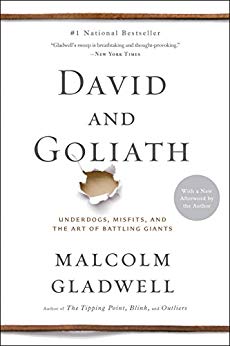

This article is an excerpt from the Shortform summary of "David and Goliath" by Malcolm Gladwell. Shortform has the world's best summaries of books you should be reading.
Like this article? Sign up for a free trial here .
Losing a parent is one of the most devastating things that can happen to a child. But, once the initial, most acute grieving subsides, is it possible that losing a parent can make a child stronger?
We’ll cover the theory of “desirable difficulties” and look at why it may not be a coincidence that some of the most successful people in history lost a parent when they were young.
The Theory of “Desirable Difficulties“
Losing a parent is a devastating, traumatic experience. But it can make the child more resilient as an adult. This idea is part of a theory of “desirable difficulties.” What makes these, or any difficulties, desirable?
- Not all difficulties are desirable—the students in the bottom third of an elite college do not benefit from feeling demoralized and discouraged from pursuing their dreams.
- On the other hand, not all difficulties (what we perceive as disadvantages) should be avoided. For instance, making a task more difficult can actually increase your chances of success on it.
Before we look at how this theory applies to losing a parent specifically, let’s see the principle in action more generally. An experiment involving the Cognitive Reflection Test (CRT) demonstrates the advantages of a desirable difficulty. The CRT is the shortest intelligence test in the world at three questions long. At Princeton, researchers first gave the test to students in clear, standard font and print size. Students scored an average of 1.9 correct answers out of three. The second time researchers gave the CRT to Princeton students, they printed the test in hard-to-read font that was 10% gray. The average score increased from 1.9 correct answers to 2.45.
Yes, CRT scores increased when researchers made the test more difficult. How can this be?
- When a task is more obviously difficult and frustrating, you slow down.
- You think more deeply about the task and devote more of your mental resources on it. In essence, you think harder.
The trauma of losing a parent may also function as a “desirable difficulty.” This doesn’t imply that losing a parent is “desirable.” It only acknowledges that fact that trauma can make us grow in ways that nothing else can.
For instance, courage is not innate; it is something you have to earn. You earn it by surviving something you didn’t think you could survive, or confronting a fear and realizing it’s not as scary as you expected.
Because it can result in courage, trauma actually leaves some people better off than they were before. How does this work?
- If the worst has already happened, you’re freed of fear to some extent. Nothing will ever be as frightening as the realization of your worst fear (an event you somehow survived).
- Overcoming fear leads to a confidence you couldn’t have earned without it. You endure the seemingly unendurable, and then you know you can live through it. It gives you a sense of your own invincibility and power.
Trauma Strengthens Some People and Weakens Others
We tend to believe that trauma affects everyone the same way, and that this effect is universally negative. There are actually 3 general effects of trauma:
- Direct hits: These are people who don’t survive the traumatic event.
- For example, the casualties of the Blitz, Germany’s bombing campaign of Britain during the Second World War, were direct hits.
- Near misses: These are people who are close to the traumatic event, perhaps even witnessing it, but survive. Trauma weakens them.
- During the Blitz, these were the people who were wounded or saw the carnage. These survivors remained preoccupied with the horror of the Blitz long after it was over.
- Remote misses: These people are slightly more removed from the traumatic event. They experience it, but not quite as acutely as those in the “near miss” group. Trauma strengthens them–they benefit from the elation and relief of being spared.
- These were the Londoners who heard the sirens and the bombs exploding, and witnessed the ruins in their neighborhood. Most of the Londoners who lived through the Blitz were in this group.
- The Germans thought that by bombing London, they would destroy the courage of the Brits. In fact, the Germans created courage in a country that was previously scared. Surviving the bombing, Londoners gained self-confidence and realized that the bombing wasn’t as bad as they had anticipated.
The Trauma of Losing a Parent
Now let’s apply this theory to losing a parent. When you’re a child, it’s your worst fear that one of your parents, your providers and protectors, will die. You can’t imagine being able to survive such a loss. We assume that children of deceased parents are worse off than peers who did not lose a parent in childhood. Are they?
A 1960s study showed that 45% of high-achieving people (judged by whether or not their lives filled more than one column in an encyclopedia) had lost a parent before the age of 20. Various studies have repeated these findings among subgroups. For instance, more than half of famous poets lost a parent before the age of 15. 67% of English Prime Ministers, from 1800 to the start of WWII, lost a parent before the age of 16. And 27% of American Presidents, from Washington to Obama, lost a parent while young.
Losing a parent is not a good thing. It’s devastating. Many children of deceased parents experience it as a “near miss.” Trauma harms rather than strengthens “near misses.” For example, prisoners are two to three times more likely to have lost a parent in childhood than people outside the criminal justice system.
However, some children experience a parent’s death as a “remote miss.” By surviving the unimaginable, they gain confidence in their ability to withstand trauma. Additionally, their other fears seem smaller and they take bigger risks (because, again, the worst has already happened).
———End of Preview———

Like what you just read? Read the rest of the world's best summary of "David and Goliath" at Shortform . Learn the book's critical concepts in 20 minutes or less .
Here's what you'll find in our full David and Goliath summary :
- Why being the underdog can actually be an advantage
- Why you shouldn't be afraid of powerful giants
- Strategies to get an edge when you're overpowered






